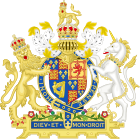Vagabonds Act 1597 facts for kids
| Act of Parliament | |

|
|
| Long title | An Act for punishment of Rogues, Vagabonds, and sturdie Beggers. |
|---|---|
| Citation | 39 Eliz. 1. c. 4 |
| Introduced by | Sir Robert Wroth (Commons) |
| Dates | |
| Royal assent | 9 February 1598 |
| Other legislation | |
| Repealed by | Vagrants Act 1713 |
|
Status: Repealed
|
|
| Act of Parliament | |

|
|
| Long title | An Acte for the Continuance and Explanation of the Statute made in the 39 yeere of our late Queene Elizabeth, intituled "An Acte for Punishmente of Rogues Vagaboundes and Sturdie Beggers." |
|---|---|
| Dates | |
| Royal assent | 7 July 1604 |
| Other legislation | |
| Repealed by | Vagrants Act 1713 |
|
Status: Repealed
|
|
The Vagabonds Act 1597 was a law passed by the Parliament of England. Its main goal was to deal with the problem of vagrancy, which meant people wandering around without a home or job.
Why the Act Was Needed
In 1597, England faced many problems. The harvest failed, leading to food shortages and high prices. Many people lost their jobs and homes. This caused a lot of hardship and even some unrest. For example, there were an estimated 10,000 people without homes or jobs in London alone.
People called these wandering individuals "vagabonds." The government saw them as a big problem across the country. One important person in Parliament, Sir Francis Hastings, suggested that vagabonds should be arrested. He thought they should be whipped and sent back to their hometowns. There, they would be made to work in a "house of correction," which was like a workhouse.
How the Law Was Passed
The idea for this new law likely came from Sir Robert Cecil, who was a top government official. He wrote down his ideas for Parliament. Many members of Parliament, especially those known as Puritans, supported this new law.
However, some parts of the bill were not popular. Many wealthy landowners in the House of Commons did not like certain rules. One person who opposed it was Sir Walter Raleigh.
On November 22, 1597, the bill was formally presented to the House of Commons. It then moved to the House of Lords, where it also caused a lot of discussion. The bill was changed many times during these debates.
Eventually, the two parts of Parliament, the Commons and the Lords, could not agree on how to describe different types of prisoners. So, the Lords created a new version of the bill. This new version was then easily passed by both houses.
What the Act Did
This Act brought in a new punishment called penal transportation. This meant that instead of being executed, some people could be sent to live in faraway colonies, like those in North America. This was a way to get rid of criminals and also to help settle new lands.
However, it's thought that this part of the law was probably never actually used. The Act also made punishments less harsh for "strolling players." These were actors and musicians who traveled around. Before this Act, they faced very severe penalties if they didn't have a special license.
Lasting Impact
The Vagabonds Act 1597 was part of a group of laws passed around the same time. These laws aimed to help the poor and control those who wandered. One important change was that "vagrants" or "sturdy beggars" were supposed to be sent back to their original hometowns. Parliament saw them as people who had moved and should return to where they came from.
The Act also required every local area, called a parish, to keep records of its residents. This included anyone who might become a vagrant. However, good records were mostly kept only in bigger cities. This made it hard to understand how the number of people without homes changed during the difficult times of the 1590s.
The Act tried to divide wandering people into two groups: unskilled poor and unemployed people looking for work. But since no one was forced to wander, the law often affected the poorest people the most.
These laws were important steps in how England dealt with poverty. The time after the Act was passed was often difficult. There were riots and outbreaks of disease in London. Also, changes in farming, called "enclosures," meant that land was fenced off for sheep. This forced many peasants off their land and into poverty.
People who lived in wooded areas were sometimes seen as more likely to cause trouble. They were thought to be involved in crime. The Act also made it illegal for beggars to use "subtle crafts" like palmistry (fortune-telling), minstrelsy (playing music), or unlicensed acting. These activities were often linked to traveling communities.
English people who wandered usually traveled alone or in pairs. They would often stop at familiar places like inns or lodging-houses. Innkeepers were expected to run their businesses properly and not allow gambling. Local courts also kept an eye on innkeepers who might be hiding vagrants without proper travel papers.
Young adults, mostly men, often wandered to find work or committed small crimes. Officials believed they should be punished, perhaps by whipping. However, some were allowed to join town life, especially since towns often needed more people due to high death rates.
Later, in 1610, it was noted that "thieves, rogues and beggars" were still causing problems. The Act also allowed some people to be forced into service in the navy. Later laws changed the rule about sending people home, perhaps because sending them to colonies in the "New World" became more useful. This idea of sending offenders to colonies instead of executing them even influenced laws in places like Australia much later.
The Vagabonds Act 1597 was eventually replaced by the Vagrants Act 1713.
|

